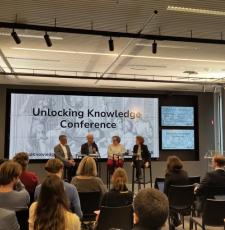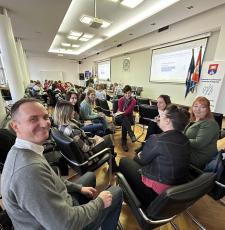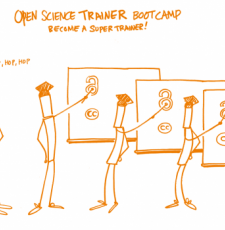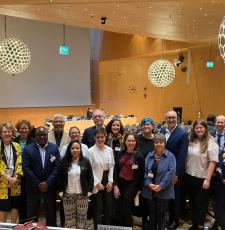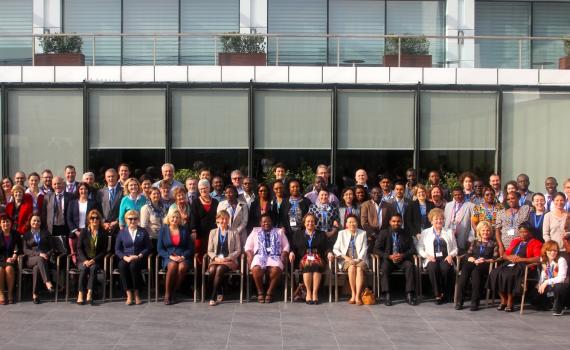
It was a long journey to get to this point. There were challenges and successes, cross-cultural learning, new friendships and incredible growth.
These were just some of the sentiments shared at the 2014 General Assembly (GA), as librarians, publishers, staff and invited speakers came together to mark EIFL’s 15th anniversary in Istanbul, Turkey.
The group of participants this year was truly international, as 98 participants from 51 countries were on hand to celebrate with EIFL during our annual knowledge-sharing and networking event, which was held from 10th to 12th of November.
EIFL's Director, Rima Kupryte, opened the GA with a special presentation and - in the context of the anniversary - reflected on EIFL's major milestones over the last fifteen years.
“Thank you to everyone who helped bring EIFL to this point today,” she said. “EIFL has had so many major milestones and achievements over the years, and we couldn’t have done it without your support.”

Three key topics were introduced by expert guest speakers in interactive “Trends to Watch” sessions: ORCID: Connecting Research and Researchers, Moving Discovery and Management Systems to the Cloud and Linked Open Data: best practices for publishing, sharing, and interlinking structured data on the Web. These sessions sparked a great deal of interest and discussion.
There was also a number of dinners sponsored by EIFL’s publisher partners. During one of the event dinners, EBSCO, the gold sponsor of the GA and EIFL's first major publisher partner back in 1999, was thanked for their years of partnership and support in providing access to electronic resources in developing and transition countries.
“EBSCO is very proud of our involvement with EIFL both then and now,” says Paul Donovan, EBSCO's Senior Vice President of Sales for Europe and Latin America. Paul was the responsible person at EBSCO for EIFL involvement for a good portion of that time.
“At its inception EIFL looked to address the real discrepancy between what information was available to the research community in developed countries versus what information was available in developing countries,” he continued.
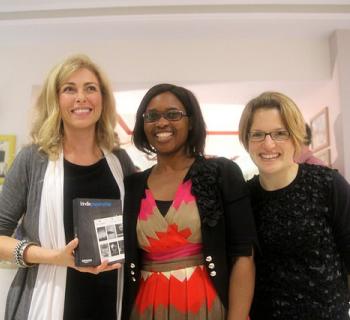
“The gap was significant and widening by the year. The EIFL project stepped in to help fill that gap and bridge the “digital divide”. EBSCO was happy and proud to play a role in that noble cause,” he says.
"Through the years the EIFL team has been tireless. It’s heartening to see those efforts continue to this day to help developing and transition countries meet the changing challenges they face."
At this year’s GA, we celebrated the impressive achievement of our partner consortium in Zambia, who made the biggest progress in both the use and take up of subscriptions to EIFL licensed resources.
An award of a Kindle went to Eness Chitumbo, Country and Licensing Coordinator for Zambia for those achievements and all of the GA participants were also treated to gifts of new EIFL t-shirts to mark the event.
The early days
EIFL was founded in 1999 and first began as a project of the Open Society Institute (now the Open Society Foundations - OSF) in Budapest.
For Marika Meltsas, an EIFL Country Coordinator and Licensing Coordinator in Estonia, attending EIFL’s anniversary GA this year was a reminder of just how far the organisation has come.
Meltsas has been with EIFL since those early years, when she was a librarian from Tartu University in Estonia and was asked to attend the very first meetings. She recalls how different the information landscape for librarians and researchers was back then.
“Fifteen years ago, even internet connectivity was a big problem for some libraries. We had to make sure that the e-resources were not only available online but also on CD-ROMS for many countries,” she laughs.
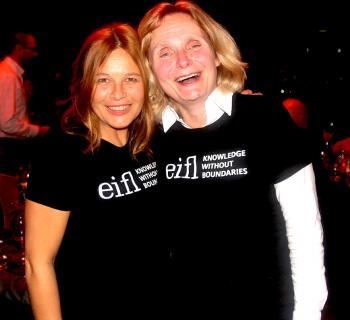 “At the time, countries like Estonia had almost no budget for libraries, and many other smaller countries had no purchasing power with publishers," she says. "So it was very important to have help from EIFL in building a library consortium who could negotiate for very low prices to help them start with even some resources,” she says.
“At the time, countries like Estonia had almost no budget for libraries, and many other smaller countries had no purchasing power with publishers," she says. "So it was very important to have help from EIFL in building a library consortium who could negotiate for very low prices to help them start with even some resources,” she says.
When EIFL first began, the team was advocating for affordable access to commercial e-journals for academic and research libraries in Central and Eastern Europe, which Meltsas was involved in.
“I still remember the first meeting with publishers in Amsterdam. When we introduced what we wished to do with EIFL and what we needed from them,” she says.
“It was very exciting for me personally, because I had never attended this type of event. It was the beginning of EIFL's licensing activities. I was excited at what was the outcome of this work we were undertaking would be,” she says.
Flash forward to today. Meltsas says that while much has changed in Estonia since EIFL began, there is remains a great need for access to online resources.
“Estonia’s research intensity has improved year by year. Our researchers are very grateful for all these e-resources they now have access to. They make use of them,” she explains.
“At the same time, the standard of living and the GDP is still much lower than advanced countries. This is reflected in the budget for research. On the whole, we are still striving to become a knowledge-based society. So these e-resources are very important to us.”
GROWTH AND CHANGE OVER THE YEARS
Arnold Hirshon, EIFL's Management Board member and Associate Provost and University Librarian at Case Western Reserve University was also with EIFL 15 years ago and can look back fondly.
He was invited to the first meeting in Budapest in 2000 to talk about the state of library consortia in the world, what has happening, and what EIFL needed to do to get organized.
“At the time there was an explosion of electronic information,” he says, describing the environment fifteen years ago for librarians. “Libraries were wondering: What should they buy? How much would it cost? From whom should they buy it?”
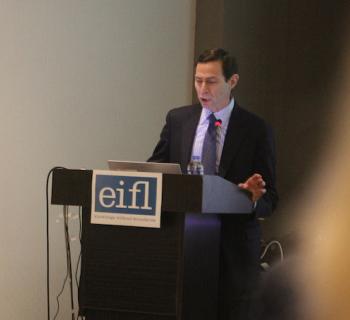 In those early days, he worked with Monika Elbert, now EIFL’s Senior Policy Advisory, helping countries to build their library consortia.
In those early days, he worked with Monika Elbert, now EIFL’s Senior Policy Advisory, helping countries to build their library consortia.
For Hirshon, being able to both witness and be involved in EIFL’s growth over the past 15 years has been incredibly rewarding.
“What has been exciting has been seeing that EIFL has grown from one block of countries to being on three continents,” he says.
“And seeing our partner library consortia do things, rather than just talk about them. Seeing them get their consortium off the ground and getting people in the libraries involved and excited about what they can do,” he continues.
"I think the most rewarding thing has been watching how so much is being done by so many librarians with so few resources,” he concludes.
"And it doesn’t stop them. They just see it as a challenge. That is the way they always dealt with their lives, and they just find a creative way of doing something with very little.”
GENERAL ASSEMBLY HIGHLIGHTS
- View EIFl’s General Assembly highlights on Storify.
- View the photos from the 2014 General Assembly on Flickr.
- View the 2014 General Assembly homepage - with the programme details, speaker bios, presentations and a list of event sponsors.
SHARE / PRINT






